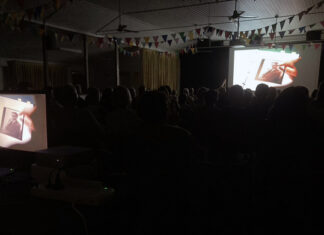 Tim Coelli, from Twis-ted Gum Wines in the Granite Belt, is still in a mild state of shock after scooping the award for the best research paper at the 2012 Annual Conference of the European Association of Wine Economists (EuAWE).
Tim Coelli, from Twis-ted Gum Wines in the Granite Belt, is still in a mild state of shock after scooping the award for the best research paper at the 2012 Annual Conference of the European Association of Wine Economists (EuAWE).
The 29th annual conference was recently held in the city of Viseu, in the beautiful wine region of Dao in Portugal.
The title of the award winning paper was “The Technical Efficiency of Wine Grape Growers in the Murray-Darling Basin in Australia”, which was a joint work with Orion Sanders from the Australian Bureau and Agricultural and Resource Economics (ABARES).
The study was motivated by a desire to look at the capacity for these irrigated wine grape producers to improve their performance in the face of the growing pressures from reduced grape prices and increased water prices.
The study uses ABARES survey data to estimate statistical production frontiers so that they can measure the technical inefficiency of wine grape growers (performance gaps between average and best producers), scale economies (to determine the best farm size) and the degree to which water is being used in an economically optimal way.
Tim, an Adjunct Professor of Economics at the University of Queensland, takes a very ‘hands-on’ approach to research.
With wife Michelle (an agricultural scientist), he owns and operates Twisted Gum Wines, a boutique Granite Belt wine producer that specialises in the production of single vineyard, dry grown (unirrigated) wines.
Their vineyard management features the extensive use of mulching and careful canopy management, which has begun to reap dividends, with their wines receiving a number of awards in recent years, from Winestate Magazine and the Royal Queensland Wine Show, among others.
Passionate about continually improving viticulture methods, Tim spoke highly of the EuAWE conference.
“It was a fantastic opportunity to hear up-to-date and informed insights from speakers from many of the top wine producing countries, including France, Italy, Spain, Portugal, Chile and the USA.
“Plus, the study tour to Dao vineyards and wineries was of particular interest to me, since the Dao region is very similar to the Granite Belt region in Australia, with high altitude and granite soils producing stylish food friendly wines in both regions,” he said.
Toast of the town
Digital Edition
Subscribe
Get an all ACCESS PASS to the News and your Digital Edition with an online subscription
19-02 Dalveen Film Society
More than a hundred years ago, the little hall at Dalveen played host to the just-invented movies– and thanks to the resilient little Dalveen...







